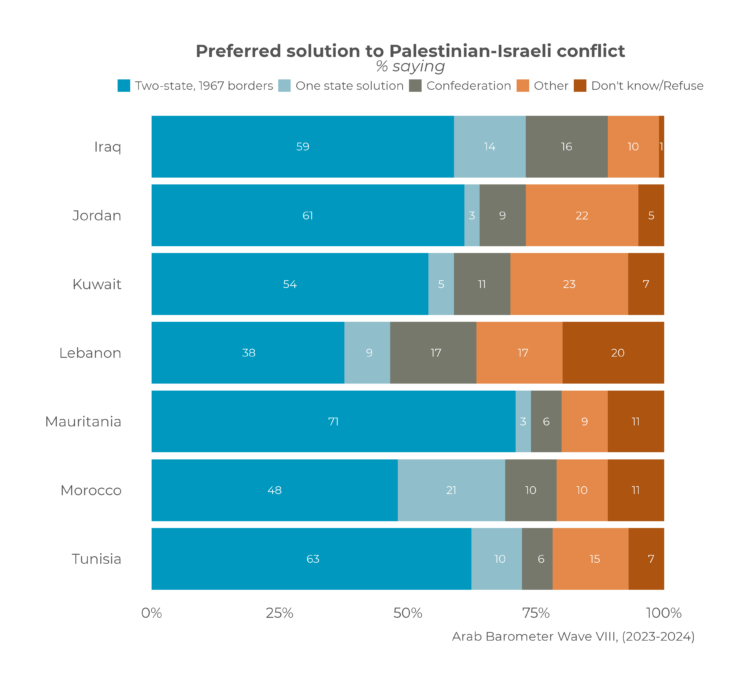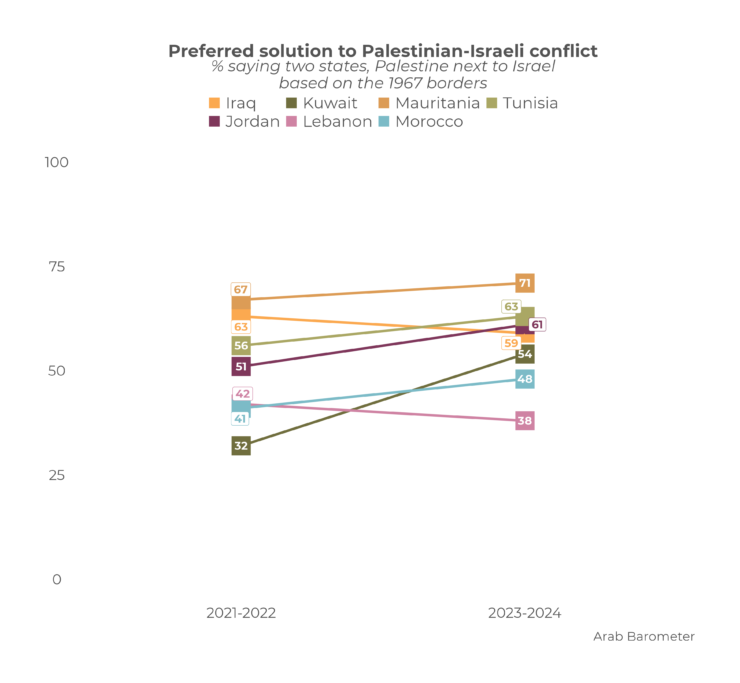The War in Gaza has had dramatic effects on views of publics across the Middle East and North Africa (MENA), as Arab Barometer findings have revealed. Unsurprisingly, views of how the Palestinian-Israeli conflict should be resolved have also been affected. Given the images coming out of Gaza, it might be expected that views toward the peace process would have hardened leading to a rise in support for radical alternatives. However, results from Arab Barometer reveal the opposite. Not only does support for a peaceful solution remain robust but it has also increased in the wake of the war in Gaza.
In its recent eighth wave of surveys, Arab Barometer included a question about the preferred solution to the Palestinian-Israeli conflict. The question included four options: the two-state solution based on 1967 borders; one state for Jews and Arabs; a Palestinian-Israeli confederation; and the option to specify a different solution. In most countries surveyed, a majority of citizens say that their preferred solution is a two-state solution based on 1967 borders. This includes as many as 71 percent in Mauritania, 63 percent in Tunisia, 61 percent in Jordan, 59 percent in Iraq, and 54 percent in Kuwait. In Morocco, roughly half (48 percent) favor a two-state solution while Lebanon is the only country where a clear minority (38 percent) hold this view.
In all countries, support for the two-state solution remains far greater than for a one-state solution or a confederation arrangement, which are two alternatives that have been suggested as potential resolutions. At most, 21 percent prefer the one-state solution in Morocco compared with at most 17 percent who say confederation in Lebanon.
For the remaining option, “other”, respondents were recorded in their own words. For nearly all of these, the respondent indicated either a military solution or a desire to see an independent Palestine that includes the state of Israel. This option was most widely supported in Kuwait (23 percent), Jordan (22 percent), and Lebanon (17 percent). In all other countries, 15 percent or fewer provide a response of “other”.

While support for the two-state solution remains the dominant preference of MENA publics, it has also risen since Arab Barometer’s last wave of surveys in 2021-2022. In Kuwait, support for the two-state solution was 32 percent (2022) while by April 2024 it was 54 percent. During a similar period, gains were also observed in Jordan, rising from 51 percent to 61 percent. In Morocco, the increase was by seven points from 41 percent to 48 percent while in Tunisia the rise was by five points and in Mauritania by four points. In Iraq, support for the two-state solution fell slightly from 63 percent to 59 percent while in Lebanon there was also a drop of four points. However, in the majority of countries there is now greater support for the two-state solution than there was before October 7.
These results underscore that the majority of those living across the MENA countries surveyed recognize that the only way to secure a long-term peace in the Middle East remains the two-state solution. Despite the horrific images from Gaza that have filled their television screens and social media feeds, the majority do not support the destruction of the state of Israel. At the same time, there is a steadfast commitment to the creation of an independent Palestine. The only realistic way to achieve this goal would be a Palestinian state coexisting next to the Jewish state, which likely explains the rise in support for the two-state solution in the time since October 7.




